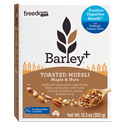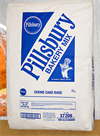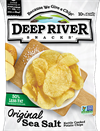Highlights
U.S. Consumers Need To Know About Benefits Of Unrefined Whole Grains
 Australia’s Freedom Foods Group is on a mission to educate American consumers about the benefits of unrefined whole grains, the kind it uses to make its range of Barley+ breakfast muesli products and snack bars. According to the company, the highly refined carbohydrates in the American diet not only do not deliver nutritional benefits like a healthier gut, they increase the risk of disease. Kroger Supermarkets in the U.S. is selling the Barley+ range, with distribution expanding in both the U.S. and Australia. The toasted muesli collection is available in three flavors: cranberry and nuts, pink lady and macadamia muesli, and maple and nut. They retail for $6.49.
Australia’s Freedom Foods Group is on a mission to educate American consumers about the benefits of unrefined whole grains, the kind it uses to make its range of Barley+ breakfast muesli products and snack bars. According to the company, the highly refined carbohydrates in the American diet not only do not deliver nutritional benefits like a healthier gut, they increase the risk of disease. Kroger Supermarkets in the U.S. is selling the Barley+ range, with distribution expanding in both the U.S. and Australia. The toasted muesli collection is available in three flavors: cranberry and nuts, pink lady and macadamia muesli, and maple and nut. They retail for $6.49. Calif. Dairy Industry Says Non-GMO Milk Is Really A “Non-Issue”
Despite criticism that smacks of mockery, a San Francisco Bay-area dairy is now selling milk labeled “non-GMO,” claiming that cows producing it had never eaten grains containing genetically modified organisms. Clover Sonoma dairy has been in the vanguard of the movement to purify dairy products by removing or keeping out troubling additives like growth hormones. Its cattle feed has been organic for two decades. But organic milk is expensive. So it devised a cheaper way to ease consumer concerns by adopting the non-GMO labeling. Industry experts, however, say it’s a non-issue. "It's really trying to market a distinction without a difference," said the president of the National Milk Producers Federation, whose "peel back the label" campaign is trying to shed some light on the topic. A UC-Davis animal genomics scientist said, “It's like unicorn-free milk. There aren't any GMOs in milk anyway."
Restaurants Can’t Ignore Customers Looking To Avoid Certain Foods
 Big restaurant chains are swerving from their standardized approach to foods and beverages to better serve customers trying to avoid gluten and dairy. Customers with food intolerances or allergies, or who are following avoidance diets, have become a market simply too large to ignore. Starbucks, for example, now sells a hot chocolate drink made with steamed almond milk. California Pizza Kitchen offers a gluten-free cauliflower crust for those who don’t eat wheat-based foods. Industry research has found that lactose comes in third, after high fructose corn syrup and GMOs, as America’s most-avoided ingredients. Gluten and wheat came in at No. 7.
Big restaurant chains are swerving from their standardized approach to foods and beverages to better serve customers trying to avoid gluten and dairy. Customers with food intolerances or allergies, or who are following avoidance diets, have become a market simply too large to ignore. Starbucks, for example, now sells a hot chocolate drink made with steamed almond milk. California Pizza Kitchen offers a gluten-free cauliflower crust for those who don’t eat wheat-based foods. Industry research has found that lactose comes in third, after high fructose corn syrup and GMOs, as America’s most-avoided ingredients. Gluten and wheat came in at No. 7. Study Claims Sugar Lobby Suppressed Negative Findings On Sugar’s Health Impact
 After years of believing that foods containing fat were the major cause of a raft of health problems, scientists and consumers now know that sugar is the real culprit. But the decades-old misperception was not an accident. It was fostered by the sugar industry, which suppressed research as long as 50 years ago that would have rung the alarm bell. A new study reveals that the Sugar Association buried its own scientific findings on the harmful effects of table sugar on rodents in the 1960s. Two studies, known as Project 259, funded by the sugar lobby proved that sugar-eating mice were at greater risk for strokes, heart attacks, and heart disease. The Sugar Association never published the results, but claims now that the reasons were circumstantial.
After years of believing that foods containing fat were the major cause of a raft of health problems, scientists and consumers now know that sugar is the real culprit. But the decades-old misperception was not an accident. It was fostered by the sugar industry, which suppressed research as long as 50 years ago that would have rung the alarm bell. A new study reveals that the Sugar Association buried its own scientific findings on the harmful effects of table sugar on rodents in the 1960s. Two studies, known as Project 259, funded by the sugar lobby proved that sugar-eating mice were at greater risk for strokes, heart attacks, and heart disease. The Sugar Association never published the results, but claims now that the reasons were circumstantial. Gold Medal, Pillsbury Baking Products Reformulated Without Artificial Colors, Flavors
 General Mills’ Gold Medal and Pillsbury baking mixes and frozen baked goods will no longer be formulated with artificial flavors or colors “from artificial sources.” The revamped line of products includes bread, biscuit, brownie, cake and muffin mixes, and frozen cinnamon rolls, muffins, and scones. According to the company, the products were reformulated to help bakeries, restaurants, and food service operations better meet the needs of customers with food intolerances or allergies, or who are following avoidance diets. Revamped Gold Medal muffin, brownie, and cake mixes will be available in June 2018. The new Gold Medal products will also have redesigned packaging with updated graphics, photography, and easier-to-read instructions..
General Mills’ Gold Medal and Pillsbury baking mixes and frozen baked goods will no longer be formulated with artificial flavors or colors “from artificial sources.” The revamped line of products includes bread, biscuit, brownie, cake and muffin mixes, and frozen cinnamon rolls, muffins, and scones. According to the company, the products were reformulated to help bakeries, restaurants, and food service operations better meet the needs of customers with food intolerances or allergies, or who are following avoidance diets. Revamped Gold Medal muffin, brownie, and cake mixes will be available in June 2018. The new Gold Medal products will also have redesigned packaging with updated graphics, photography, and easier-to-read instructions.. Abbott Labs Develops A Way To Make Curcumin Useful As Dietary Supplement
Though the yellow compound curcumin found in turmeric has been shown to have health benefits, especially in osteoarthritis and rheumatoid arthritis applications, it is not bioavailable because it is insoluble in water. To solve that problem, Abbott Laboratories developed a curcuminoid formulation that uses phosphatides and dextrins to improve oral bioavailability. The company’s global patent application says the chemicals can be used in food-grade applications because they have been approved by regulatory agencies, a stumbling block for other attempted remedies. The patent application said that its blend of curcuminoids, dextrins, and phosphatides “significantly increased” the aqueous solubility of the curcuminoid.
Cinnamon Compound May Provide Therapy For Obesity
Exposing fat-derived human stem cells to a cinnamon compound results in thermogenesis (heat production) and metabolic remodeling that could reduce obesity, according to research by Chinese and U.S. scientists. Cinnamaldehyde, the compound that gives cinnamon its flavor and scent, is known to protect against obesity and hypoglycemia in mice, so the researchers wanted to test its impact on human cells. They observed that cinnamaldehyde consistently activated thermogenesis in the human tissue in vitro, making it a “promising therapeutic target for obesity.”
Arca Unit Acquires Clean Label Snack Maker Deep River
 One of Coca-Cola’s largest Latin American bottlers and the owner of Wise Snacks has acquired Connecticut-based Deep River Snacks, a clean label, “better-for-you” food company. Fifteen-year-old Deep River, whose annual sales are about $45 million a year, produces “clean and conscientious,” non-GMO snacks for the U.S. market. The company also donates a significant share of its profits to charitable organizations annually. The acquisition will give Deep River access to Arca Continental’s strong distribution network, and will allow the company to invest more heavily in innovation. Arca is Coke’s second largest bottler in Latin America..
One of Coca-Cola’s largest Latin American bottlers and the owner of Wise Snacks has acquired Connecticut-based Deep River Snacks, a clean label, “better-for-you” food company. Fifteen-year-old Deep River, whose annual sales are about $45 million a year, produces “clean and conscientious,” non-GMO snacks for the U.S. market. The company also donates a significant share of its profits to charitable organizations annually. The acquisition will give Deep River access to Arca Continental’s strong distribution network, and will allow the company to invest more heavily in innovation. Arca is Coke’s second largest bottler in Latin America.. New Wheat Variety Is Rich In Healthful Resistant Starch
 Australian scientists have developed a high-amylose wheat variety that contains more than ten times the amount of resistant starch compared to regular wheat. Farmers in Minnesota and Washington have become the first to harvest the wheat, whose amylose content is 85 percent rather than the normal 20 to 30 percent, for processing into flour. U.S.-based Bay State Milling Company is bringing the new wheat into the U.S. market under the brand name HealthSense high fiber wheat flour. It will be incorporated into a range of food products, including bread. Resistant starch improves digestive health, protects against the genetic damage that precedes bowel cancer, and helps combat Type 2 diabetes. Unfortunately, it is missing from the diets of millions of people globally..
Australian scientists have developed a high-amylose wheat variety that contains more than ten times the amount of resistant starch compared to regular wheat. Farmers in Minnesota and Washington have become the first to harvest the wheat, whose amylose content is 85 percent rather than the normal 20 to 30 percent, for processing into flour. U.S.-based Bay State Milling Company is bringing the new wheat into the U.S. market under the brand name HealthSense high fiber wheat flour. It will be incorporated into a range of food products, including bread. Resistant starch improves digestive health, protects against the genetic damage that precedes bowel cancer, and helps combat Type 2 diabetes. Unfortunately, it is missing from the diets of millions of people globally..
Copyright 2025 Business360, Inc.


